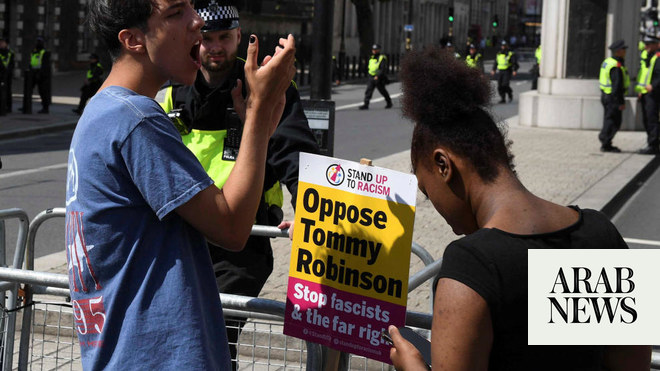DHAKA: Bangladeshi police have released from hospital and arrested the leaders of student protests that sparked nationwide unrest last week when security forces clashed with demonstrators.
Students have been protesting since the beginning of July against a law that reserved most government jobs for descendants of those who fought in the country's 1971 war of independence.
At least 209 people have been killed and thousands injured, according to a count based on local media reports after it turned into protests last week.
The worst casualties were reported in Dhaka, which saw fierce clashes between protesters, government supporters, police and paramilitary forces that left the country in a six-day communications blackout.
Among the injured are student leaders Naheed Islam and Asif Mahmoud, the coordinators of Students Against Discrimination, the main group organizing the demonstrations. They were patients of the Gunushatya Hospital in Dhaka from where they were arrested by the Detective Branch of the Dhaka Metropolitan Police on Friday evening. Another student leader who was visiting Islam and Mahmoud, Abu Bakr Majumder, was also arrested.
Detective Branch chief Haroon Urshid told reporters in Dhaka on Saturday that the three were detained “for security reasons” as their families were concerned about their safety.
“We took them into our custody so they would be safe,” he said.
A hospital worker told Arab News that the student leaders were arrested by a group of twelve plainclothes officers despite the opposition of the medical staff.
“Initially, we tried to make them understand that without proper protocols, hospitalized patients cannot be discharged from the hospital. Later, they talked to our officials and took the students from the hospital. “There was no way we could hold them any longer.” This hospital worker, who asked not to be named, said.
“The health of the students was not very good… Asif was struggling with low blood pressure and Nahid was suffering from blood clots and bruises in different parts of his body. “Both of them needed more treatment.”
The arrests come in a crackdown launched by police in Dhaka, where a curfew imposed last week remains in place.
Dhaka Metropolitan Police Joint Commissioner Leighton Kumar Saha said 2,284 people had been arrested in Dhaka in clashes related to the protests, during which many administrative offices were set on fire.
We are analyzing footage from different locations and identifying the villains. When it is confirmed that someone is missing in the chaos, we conduct an operation to arrest them. He told Arab News: This work has been done transparently and we are investigating the people who were involved in the vandalism.
In the last 24 hours, 245 people were arrested in Dhaka. Our movement will continue until the situation returns to normal.”
International rights groups have repeatedly expressed concern over Bangladesh's handling of the protests, and Amnesty International has said that witness testimony and video and photographic evidence “confirm the use of illegal police force against student protesters”.
The protests began after the Supreme Court upheld a controversial quota system in which 56 percent of public service jobs were reserved for certain groups, including women, marginalized communities and the children and grandchildren of freedom fighters – which the government 30 A percentage of them has been considered for them. Posts.
The Supreme Court last week relaxed the quota system and ordered that 93 percent of government jobs be allotted on the basis of merit.
